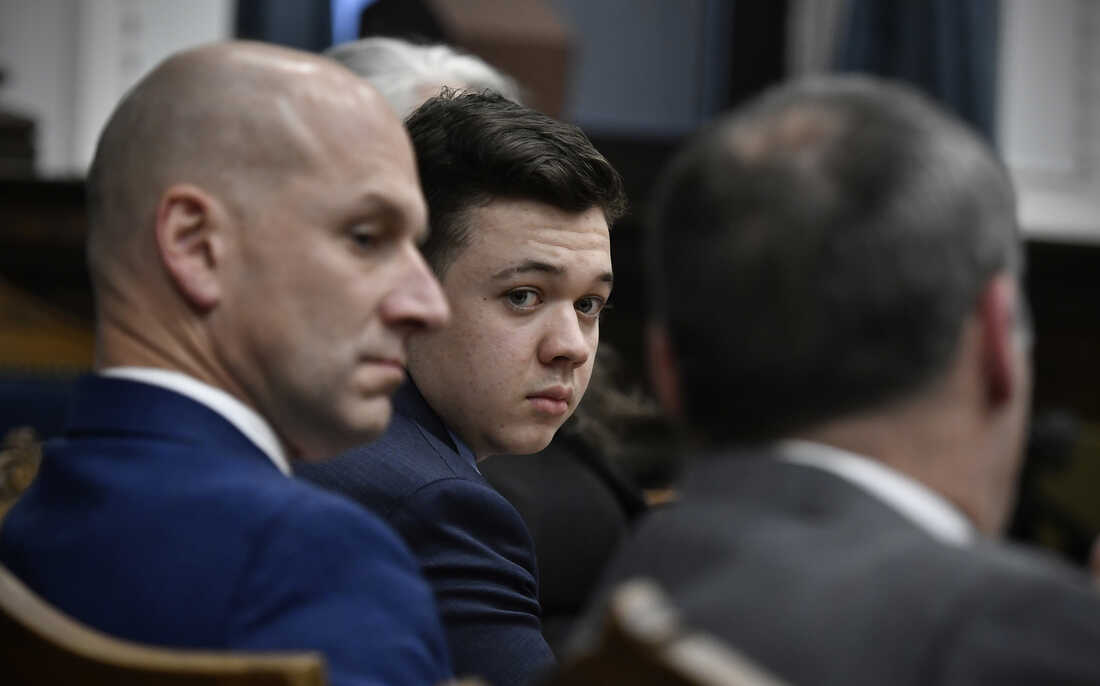Pictured above: Kyle Rittenhouse was 17 years old when he shot three and killed two people in 2020. He was acquitted of all charges on Friday, Nov. 19.
Courtesy of NPR
By Molly Ryan
Though idealized, the “American Dream” is subjective. This rings true in recent criminal justice cases that struck a chord in the public sphere.
On Thursday, Nov. 18, 41-year-old Black man Julius Jones, who was convicted of murder in 1999, was taken off death row after public outcry over substantial evidence supported his innocence.
The next day, it was announced that Kyle Rittenhouse, tried for the death of two men, would be acquitted of all charges.
Jones, a then- 19-year-old sophomore at the University of Oklahoma, was arrested for the 1997 murder of 45-year-old businessman Paul Howell after being named the prime suspect in 1999.
According to a 2019 OU Daily article, Jones was on the cusp of earning a basketball scholarship from the university when he was arrested for the murder.
At 22-years-old, Jones was sentenced to death in 2002.
After nearly two decades on death row, Jones’s scheduled execution date of Nov. 18 became the day his sentence turned to life in prison without possibility of parole.
After a series of social media posts demanding Jones’s innocence be taken into consideration, Oklahoma Gov. Kevin Stitt announced the inmate’s clemency.
According to a 2014 study cited in The LA Times, it was “estimated that if all death-sentence defendants remained under sentence of death indefinitely, at least 4.1% would be exonerated.”
“For over 20 years, I have been haunted by the idea of watching my baby boy die in an execution chamber for a murder that occurred when he was home with his family,” Madeline Davis-Jones, the inmate’s mother, said in a tweet on the @Justice4Julius twitter page. “I am grateful that after today’s decision by the governor, that can no longer happen.”
When asked to speak on her brother’s clemency, Antoinette Jones went further explained, “We aren’t yet sure what our legal options are or what the path forward looks like, but we are still committed to bringing Julius home and we will never give up that fight.”
While Jones’s clemency was a victory for those advocating against his execution, the news of Rittenhouse’s acquittal was a step in the other direction.
On the night of Aug. 25, 2020, in the wake of the murder of Jacob Blake by police in Kenosha, Wis., Rittenhouse, 17 at the time, shot three and killed two people amid city-wide upheaval.
In addition to three homicide charges (one of which was attempted), Rittenhouse was charged for two counts of first-degree recklessly endangering safety — all these charges were ruled as “not guilty,” in addition to the dismissed charges for possession of a dangerous weapon by a minor and failure to comply with a local emergency order.
Many young people, like junior interdisciplinary social sciences, with a concentration in anthropology and religion, major Morgan Davis, believe the verdict is a clear fallacy and demonstration of character for the U.S. justice system.
“After Kyle Rittenhouse was found innocent of all charges of murder, at least three Republican state representatives made comments implying the accused shooter would make a wonderful congressional intern,” Davis said.
Following Rittenhouse’s verdict, several people from both sides of the political spectrum took to social media to express their views on the acquittal.
“The verdict in the Kyle Rittenhouse case is a travesty and fails to deliver justice on behalf of those who lost their lives as they peacefully assembled to protest against police brutality and violence,” said NAACP President and CEO Derrick Johnson on the verdict. “Rittenhouse’s decision to go to Kenosha and provoke protestors was unwarranted.”
“This verdict is a reminder of the treacherous role that white supremacy and privilege play within our justice system,” Johnson said. “In the midst of this disappointing verdict, we must continue to work to ensure that those who seek to harm progress do not find refuge for their illicit acts in a system meant to protect victims.”
When asked for his response on the verdict, President Joe Biden said, “Look, I stand by what the jury has concluded. The jury system works, and we have to abide by it.”
In response to his statement, many criticized Biden’s lack of knowledge about the case and his unwillingness to express grief as someone who previously empathized with the Black Lives Matter Movement.
“Keeping up with prominent trials like those of Ahmaud Arbery and Kyle Rittenhouse is an important part of being an informed voter,” Morgan said. “As we see the same story play out over and over, we are the ones who need to make a change.”



